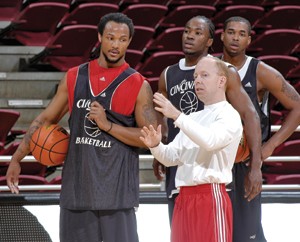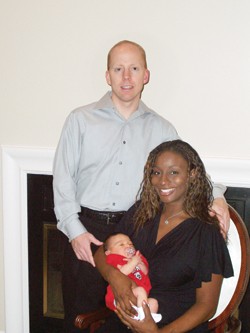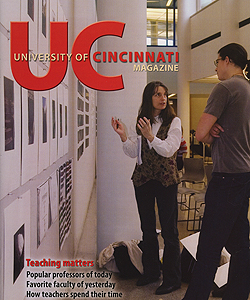'They're not names to me; they're people'

UC's first-year head coach Cronin works nonstop to develop his players, both on court and off. Photo/Andrew Higley
Asked to recall his best day as a coach, Mick Cronin pauses. "That's a tough one," he groans.
Most would expect the Bearcats head coach to automatically settle on the day he got his "dream job" at UC. But he doesn't. "The feeling of euphoria and excitement when I got the job as the head coach at Cincinnati is probably something I'll never experience again," he says. "But I don't know if it was my most successful day."
The intense competitor in Cronin -- a Bob Huggins assistant at UC from 1997 to 2001, who returned to Cincinnati last year following stints at Louisville and Murray State -- would rather think his best day involved a big win or even the signing of a talented recruit.
Cronin, the son of a coach, was practically raised in the gymnasium. He played basketball "nonstop" from seventh grade through his senior year. "I was an addicted player," he admits. When a knee injury dashed his hopes to play in college, he turned to coaching high school at 19.
So, in his mind, it would seem almost a disservice to the game for his favorite moment to have occurred off the court. At the very least, his best day should revolve around the accomplishments of one of his players rather than his own.
"I know my worst day," the 35-year-old offers instead. "The day Kenyon broke his leg." That day was March 9, 2000, when, minutes into the conference tournament game against St. Louis, UC's Kenyon Martin, the consensus national MVP, fractured his fibula.
Considering that that day ranks among the most disappointing sports moments in Cincinnati history (perhaps second only to Carson Palmer's playoff-ending injury in 2005), Cronin's choice isn't terribly surprising. After all, the Bearcats, the No. 1 team in the country -- with Martin, the most dominant player in the country -- were favored to win the national championship.
What is surprising, however, is why Cronin calls it his worst day.
While fans watched the season slip away as No. 4 was helped from the court nearly seven years ago, Cronin worried he was watching Martin's career crumble. The 28-year-old assistant coach agonized over the seriousness of the injury to a player who turned down a chance to go to the NBA to return to UC for his senior year.
"I was really close with Kenyon back then," Cronin says. "The guy's bone was sticking out of his leg, and I am thinking, 'Man, oh man, this could be tragic.' But I was trying not to show that to him. I was trying to be positive with him. That was a rough day."
Cronin says people often remind him that UC would likely have won the championship had Martin remained healthy. And he agrees. But there are times, as a coach, when winning is secondary. The well-being of his players comes first.
"I always tell the kids, as a coach, my career will continue. But individual players have only one shot to make it. Fortunately, it worked out for Kenyon. (He was still the No. 1 pick in the 2000 NBA draft.) But at the time, we didn't know."
When University of Cincinnati players face adversity, boosters worry how it will affect the team's record. But head coach Mick Cronin's concern is more personal. At the time of this interview, for example, the NCAA hadn't yet ruled that Hernol Hall and Adam Hrycaniuk would be ineligible to play this year because of their participation in foreign competition.

Coach Mick Cronin, A&S '97, and his wife, Darlene, MSW '01, welcomed Samantha into their lives in October 2006. The coach admits that becoming a daddy has altered his outlook, particularly when it comes to escaping the stresses of the job. Photo/courtesy of UC Athletics
"Everybody is concerned because they want to see those guys help the Bearcats this season," he says. "But the human aspect of it is that I see those kids every day. They're not names to me; they're people. I gotta look in their eyes and feel their pain."
Cronin's concern for his players doesn't stop the day they leave the program either. It never has. In fact, he cautions recruits that playing for him is a lifelong commitment for both parties. And to prove it, he often calls former players out of the blue to check up on them.
"When a light goes on for one of my players and I can see that he's gonna have a nice life, that he is going to be OK, that's the most rewarding time," the coach shares. "I don't want to be living on a hill in Mount Lookout, and the guys that helped me get there are struggling.
"That's why I beat on them so hard to get on their academics and get their degree. Making money doesn't happen for everybody between the lines. You have to have some options." Cronin lights up when he talks about his conversations and visits with former Bearcats such as Pete Mickeal, Att. '00, and Ryan Fletcher, Ed '00, both of whom have been successful playing basketball overseas.
"Ryan came to see me, and we spent a couple hours together," Cronin says. "He's married. He's playing, and he's investing his money in real estate and property management. That's what it's all about. He used his time here to figure out how to live off the court."
One of Cronin's favorite tactics for getting through to players is bringing in those who shared the same locker room to talk about their lives after basketball. It is a way to instill confidence that they too can be successful holding down a "normal job." Former players he has turned to include Anthony Buford, Bus '92, and Keith Starks, Ed '92, who are in finance. Tarrance Gibson, Att. '93, is a sales manager for JTM. Terry Nelson, A&S '98, is a minister and runs his own youth sports program, as does Alex Meacham, A&S '98.
"People don't know how far coaches go to try to help their players off the court," says Cronin. "You try to be there and counsel them and try to help them segue into life and be father figures to them."
According to Cronin, if his players know he believes in them off the court, they will believe in him on the court. It is a relationship built on trust.
"Whether they are six, 16 or 22, you can't underestimate the impact you have as a coach on your players. That's the most important thing. And it needs to be the most important thing."
Mick Cronin, A&S '97
Age: 35
Experience JV Head Coach at Woodward High, 1991-96
Video Coordinator at UC, 1996-97
Assistant Coach at UC, 1997-2001
Associate Head Coach at Louisville, 2001-03
Head Coach at Murray State, 2003-06
Head Coach at UC, 2006-
Links:
Follow the Bearcats day to day
Dan Cronin on his brother after Mick was hired

 Issue Archive
Issue Archive